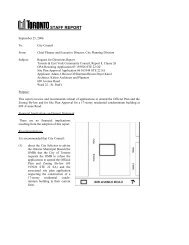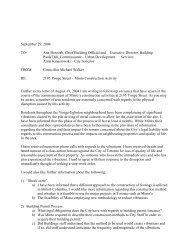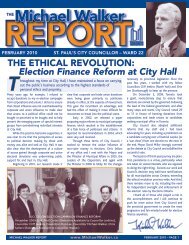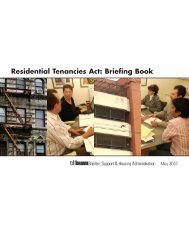Residential Tenancy Reform Consultation Paper
Residential Tenancy Reform Consultation Paper - Michael Walker
Residential Tenancy Reform Consultation Paper - Michael Walker
You also want an ePaper? Increase the reach of your titles
YUMPU automatically turns print PDFs into web optimized ePapers that Google loves.
Other issues and concerns<br />
RESIDENTIAL TENANCY REFORM CONSULTATION PAPER<br />
The preceding chapters contain options for implementing<br />
the government’s commitments for proposed<br />
residential tenancy reform. We are seeking input from you<br />
on how to make these initiatives work.<br />
In addition, we are also interested in hearing about any<br />
other issues or concerns you may have. We want to know<br />
how you feel the system is working, whether you think the<br />
rules are fair and how you think things can be improved.<br />
Below are examples of some comments from constituents<br />
and pre-consultation meetings with stakeholders. If these<br />
are concerns of yours, we invite you to make your views<br />
known. If you have other concerns or suggestions, we<br />
want to hear them too.<br />
Ontario Rental Housing Tribunal processes<br />
We have heard concerns and suggestions about the effectiveness<br />
of the Ontario Rental Housing Tribunal (the<br />
Tribunal). The Tribunal was established to be a more efficient<br />
and approachable adjudicative body than the courts.<br />
In 2002-2003, approximately 70,000 applications were<br />
filed, of which 60,000 related to termination of tenancies.<br />
29,000 of these cases went to a hearing. The average<br />
waiting time between filing an application and the hearing<br />
was 16-20 days (excluding applications for aboveguideline<br />
rent increases). The Tribunal has provided a necessary<br />
service for both landlord and tenants. However,<br />
concerns about the following issues have been raised, and<br />
we welcome your comments and suggestions on these<br />
and any other issues:<br />
• fees<br />
• public availability of orders<br />
• access to mediation<br />
• process for evictions and recovery of rent arrears<br />
• opportunity for tenants to state their case at hearings.<br />
These fees are charged by the Tribunal in recognition that<br />
the service being provided applies specifically to the landlord<br />
or tenant, and is not of a general benefit to the public.<br />
However, the fees only cover some of the Tribunal’s<br />
costs. Should a greater share of the Tribunal’s costs be<br />
recovered through fees? This would benefit taxpayers as a<br />
whole, because their tax dollars would not need to pay for<br />
services sought by specific landlords and tenants.<br />
However, higher fees could be prohibitive for some landlords<br />
and tenants. In addition, some landlords argue that<br />
the cost for an eviction application (usually due to nonpayment<br />
of rent) is already high, considering the additional<br />
cost of Sheriff’s fees. Further, high fees for evictions can<br />
be difficult for tenants, as the tenant is required to pay the<br />
application fee, as well as any arrears of rent, in order to<br />
void an eviction order.<br />
We would also like to hear your views on making information<br />
contained in Tribunal applications and orders more<br />
widely available to the public. We have heard from landlords<br />
and tenants that this information would be helpful in<br />
making decisions about whether to file applications with<br />
the Tribunal, or in preparing for hearings before the Tribunal.<br />
Public interest in making this information more available<br />
will have to be balanced with legislative requirements<br />
relating to privacy and administrative proceedings. We<br />
would like your input on ways to make this possible.<br />
Long-term sustainability of rent banks<br />
The government has recently announced a provincial rent<br />
bank program, which has endowed municipal rent banks<br />
(operated by Consolidated Municipal Service Managers)<br />
with $10 million. Rent banks help keep people in their<br />
homes by providing short-term assistance where the tenant<br />
may have been unable to pay rent. This provides a benefit<br />
to both tenants and landlords, as it prevents the disruption<br />
to both tenants and landlords caused by eviction.<br />
It is anticipated that in the long term, rent banks could<br />
be a sustainable means of providing assistance. We are<br />
looking for ideas on how this can be accomplished. One<br />
example is through “insurance funds.” This means tenants<br />
and/or landlords could pay a very small premium for longterm<br />
protection against short-term default of rent payments.<br />
We would like to hear your views on this idea, and how<br />
to ensure that rent banks can be made sustainable.<br />
30






